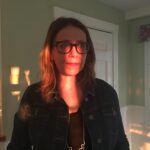On Images

Vesna Pavlović is a 2022-2023 RPW Center Faculty Fellow. This year’s group is exploring the theme of “Mending and Transforming.”
Images have taken an unprecedented role in our lives. Vast amounts of existing and newly taken photographs, found and computer-generated, are widely and instantaneously disseminated through social media platforms. My photography challenges these conditions by exploring the traditional repositories such as archives, often suspended, forgotten, and in danger of disappearance. I am motivated by the urgency of the current state of the photographic medium and the newly formed ‘aura’ that images gain in this era. In this newly expanded field, perception is in continuous evolution.
Art has a powerful role to play in creating a safe place to talk about the memory, place, and violent erasure, in order to imagine a more equitable and just future.
Hal Foster writes about the artists who “want to push the futuristic freedoms of new media, and others who want to look at what this apparent leap forward opens up in the past, the obsolete.” I locate myself in this latter area of artistic examination, as I consider the objects of the past, treating them in an innovative, and digital way. Throughout my career, my photographs and artwork have addressed several important issues and questions in contemporary art, including: new modes of documentary photography, photography’s expanded field, visual translation of historical archives, the relationship of photography to film, and the omnipresence of images in contemporary culture.
My research project, The Woven Wind developed as a series of artistic interventions within the historic archive of the University of the South, Sewanee’s Special Collection Library. This multi-layered, multi-year research project is a platform for education, conversation, empathy, and healing. It aims at reconciling and reconsidering the history of slavery, trauma, and loss. In 2018, I joined the Roberson Project on Slavery, Race, and Reconciliation group at the Sewanee, University of the South, a six-year initiative investigating the university’s historical entanglements with slavery and slavery’s legacies. I was invited to work with history students to visually translate the recently discovered archival findings of pre- and post-Civil War history tied to the Sewanee’s storied Lovell-Quitman family.
These papers, including extensive plantation records and documents from the Lovells’ service in the Confederate military, came to the university’s archives through an association with William Storrow Lovell and his wife, Antonia, who was the daughter of John A. Quitman (1799-1858), a large slaveholder and one-time governor of Mississippi. I consider the Lovell-Quitman archive a site of painful memory and erasure. In a moment of historical reckoning in American society and globally, this project has a special charge for me. Art has a powerful role to play in creating a safe place to talk about the memory, place, and violent erasure, in order to imagine a more equitable and just future. The complexity of representing the enslaved remains at the core of the project. How to ethically amplify the voices of the enslaved, and their visibility?
In this project, I collaborate with an interdisciplinary team including artists Courtney Adair Johnson and Marlos E’van, Mélisande Short-Colomb, community advocate at Laboratory for Global Performance and Politics at Georgetown, musician Rod McGaha, genealogist Jan Hillegas, and Woody Register, director of the Roberson Project on Slavery, Race, and Reconciliation University of the South, Sewanee.
Vesna Pavlović (MFA Visual Arts, Columbia University 2007) is recipient of 2022 TAC Arts Access Grant, 2021 Current Art Fund Grant, 2020 Smithsonian Artist Research Fellowship, Fulbright Scholar Award in 2018, and George A. and Eliza Gardner Howard Foundation grant in 2017. She exhibited widely including Phillips Collection in Washington DC, Frist Center for the Visual Arts in Nashville, the Untitled, 12th Istanbul Biennial, 2011, Turkey; MAC – Metropolitan Arts Center in Belfast, Northern Ireland, Württembergischen Kunstverein, Düsseldorf, Germany, among others. Her work is included in major private and public art collections, including Phillips Collection, the Hirshhorn Museum and Sculpture Garden, Museum of Women in the Art, and Museum of Contemporary Art, Belgrade, Serbia. Recent publications include Vesna Pavlović, Stagecraft (Vanderbilt University Press, 2021) and Vesna Pavlović’s Lost Art: Photography, Display, and the Archive (Hanes Art Gallery, Wake Forest University, 2018).
Website: https://www.vesna-pavlovic.com/ Instagram: @studio_vesnapavlovic Twitter: @artistvesna